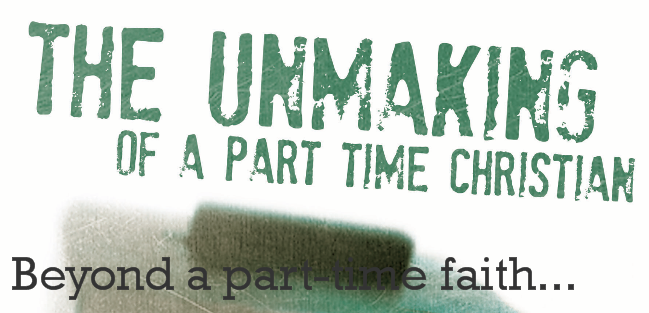 Wednesday evening I started a new 8-week study with my men's group, affectionately known as "The Men's Room" - or "The Gathering of Most Excellent Dudes."
Wednesday evening I started a new 8-week study with my men's group, affectionately known as "The Men's Room" - or "The Gathering of Most Excellent Dudes."I'm teaching my new book, "The Unmaking of a Part-Time Christian," and so we kicked off by talking about exactly what we mean when we say something like, "I'm a Christian."
I asked for sound-bite definitions. "Imagine you're at a party," I said, "or sitting next to someone on an airplane, or maybe in casual conversation during the intermission at some kind of event... How, given only a few sentences, would you answer the question 'How would you define Christian?' or 'What do you mean when you say you're a Christian?'"
The answers - and I gave everyone a few moments to think first - were a hodgepodge of loosely related phrases. I wrote them on the chart. They didn't look all that compelling!
"Where did you get the information?" I asked. "How did you know what to say?"
It's a question I've asked upwards of 500 people as I've been traveling around and talking about the project. Here are some of the responses - from Florida, North Carolina, and Tennessee.
- Well, everyone knows what a Christian is...
- It's what my preacher said...
- I got it from the people I hang out with...
- I got my definition from the Internet...
- I've been reading the Bible...
Then Jesus - who didn't spend much time talking about church politics, denominational preference, or who's got the best church - said this. "Look, everyone in the world is going to know you're my disciples because of the way you love one another." Then he said this: "People will know you're my followers if you keep my teaching."
It's one reason I tend to say "I'm a Jesus follower." Because everyone already thinks they know what a "Christian" is. They don't want anything to do with that. So I say I'm a Jesus-follower; people ask "what's that?" Then I can explain.
 It's a good idea to understand what we believe. Not so we can prove other people wrong, but so we actually have something of substance to share.
It's a good idea to understand what we believe. Not so we can prove other people wrong, but so we actually have something of substance to share.Think about it. Not enough of us do.
- DEREK

No comments:
Post a Comment